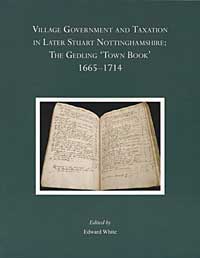Thoroton Society Record Series
Thoroton Society Record Series, 45 (2010). Village Government and Taxation in Later Stuart Nottinghamshire: The Gedling ‘Town Book’ 1664-1714 Edited by Edward White.
 |
This new book – volume 45 in the Thoroton Society’s Record Series - is edited by Gedling resident Ted White with a Foreword by Professor Martyn Bennett of Nottingham Trent University. It prints transcripts of the unusually complete financial accounts of the Constables, Churchwardens and Overseers of the Poor of Gedling which were recorded in a single manuscript volume called the ‘Town Book’. These provide a rare insight into the actual working of local government at village level at this period.
Ted White says : ‘In 1665 - the year of the Great Plague - the Gedling parish clerk called Richard Sleight bought a new blank book for him to write the annual financial accounts of the unpaid parish officials. In doing so he and his successor recorded snapshots of the everyday lives of the villagers for almost half a century, leaving us with a unique insight into the lives of our ancestors’.
Ted White’s introduction skilfully analyses the accounts in careful detail to show how an ordinary English parish coped with the day-to-day demands of raising taxes for such matters as church repairs, policing, relieving the poor, and national wars. As well as being of interest to Nottinghamshire historians it will serve as an exemplary study of value to parish historians throughout the country.
The book shows the parish officials maintaining the church fabric - for example repairing the roof and purchasing a new clock for £ 3 - as well as multifarious activities such as running the church school and a charitable ‘bank’, making collections for national and even international disaster relief, and rewarding villagers for catching moles and other vermin.
The accounts include much detail about the effect of the Poor Law – the social security system of the period – on actual families and individuals. They show vagrants being whipped by the constables at the village whipping post. Pregnant spinsters and single mothers are forcibly removed to places as far away as Lincoln to avoid parish residents having to support them (although they did support Ann Barnes for fifteen years and then buried her at parish expense). Numerous examples of human tragedies and hardship are recorded, for example the new-born baby found in a barn who was baptised Moses but died before he was one-year old, 'Old Harwood' who hanged himself, and John White from Nottingham who was found dead on the road at Mapperley Plains.
The Town Book includes a complete list of all the farmers and cottagers in the village in 1667, and this edition reproduces a map of Gedling in 1609 showing the extent of the commons, woods, and open fields farmed in strips. It also includes reconstructions of typical farms and cottages of three local residents linked to contemporary lists of their household furniture and farmstock. In addition it reveals how one young villager, Thomas Greenfield, emigrated to America to become a very wealthy tobacco farmer and a member of the Maryland State Council.
Please see the Ordering Thoroton Society publications page for information on purchasing Record Series volumes.